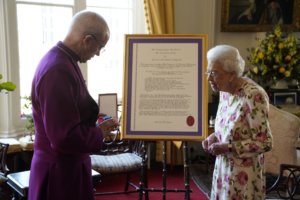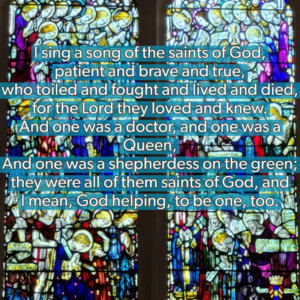
An Everyday Saint of God
 Queen Elizabeth II died peacefully at Balmoral Castle in Scotland on Thursday after 70 years on the throne. For Britons and citizens of all the realms and territories of the United Kingdom — and even for those of us who are political and historical onlookers to her reign — she’s the only queen most of us have ever known. The United States has a complicated political and historical relationship with the British monarchy — some of it played out right here in Newport. And yet our very heritage as Episcopalians is in the independence of the Church of England from the Pope’s authority established back in Henry VIII’s time, setting the stage for the independence of all of our 42 Provinces in the Anglican Communion. And so despite — or even more likely, because of our complicated, intertwined history and context — we can’t help but stop and notice the end of the longest reign of any British monarch, or for that matter, the longest term of authority of any head of state in history.
Queen Elizabeth II died peacefully at Balmoral Castle in Scotland on Thursday after 70 years on the throne. For Britons and citizens of all the realms and territories of the United Kingdom — and even for those of us who are political and historical onlookers to her reign — she’s the only queen most of us have ever known. The United States has a complicated political and historical relationship with the British monarchy — some of it played out right here in Newport. And yet our very heritage as Episcopalians is in the independence of the Church of England from the Pope’s authority established back in Henry VIII’s time, setting the stage for the independence of all of our 42 Provinces in the Anglican Communion. And so despite — or even more likely, because of our complicated, intertwined history and context — we can’t help but stop and notice the end of the longest reign of any British monarch, or for that matter, the longest term of authority of any head of state in history.
The end of such a long reign challenges our understanding of worldly power, and the myth of institutional permanence. And regardless of our forebears’ differences in perspective on autonomy, taxation, and forms of government that surrounded our country’s fight for independence 250 years ago, we have to acknowledge both our origins as a nation and our close relationship in the centuries that followed.
For example, as we mark the 21st anniversary of the September 11th attack on our nation today, it’s meaningful to remember that Queen Elizabeth II broke with 600 years of British royal tradition by having the royal band play the “Star Spangled Banner” during a changing of the guard ceremony at Buckingham Palace on September 12, 2001. How do we make meaning of this moment in our lives, when we all pause in the shadow of its magnitude?
Tributes and messages of respect and support by world leaders and heads of churches are on constant loop on the news, and services of remembrance all over the world have honored Queen Elizabeth’s long reign. Here at Emmanuel, Jere and I tolled the bells 96 times at noon this past Friday to honor her 96 years of life, as churches all over the world have done in these past days. Bell Ringing Saturday at 6:00 pm at Trinity, Bishop Knisely will preside, and Father Kevin, Father Tim, and I will assist, in a joint service of remembrance on behalf of the three Newport Episcopal churches in advance of the Queen’s funeral on Monday.
 Our faith leaders try to put events into personal perspective for us, honoring the enormity of the moment while bringing us in close to see Queen Elizabeth’s humanity. The Archbishop of Canterbury spoke Friday of his meeting with the Queen in June of this year, saying, You felt that history was in front of you, but it was history with those piercingly blue eyes twinkling, that extraordinary smile and the relishing of a quick dry comment.
Our faith leaders try to put events into personal perspective for us, honoring the enormity of the moment while bringing us in close to see Queen Elizabeth’s humanity. The Archbishop of Canterbury spoke Friday of his meeting with the Queen in June of this year, saying, You felt that history was in front of you, but it was history with those piercingly blue eyes twinkling, that extraordinary smile and the relishing of a quick dry comment.
Anthony Lane of The New Yorker wrote Saturday that Elizabeth II, by the Grace of God, of the United Kingdom of Great Britain and Northern Ireland and of Her other Realms and Territories Queen, Head of the Commonwealth, Defender of the Faith… was a countrywoman at heart. That is to say, she was hale, sane, shrewd, constitutionally stoic, and schooled to believe that time spent on emotional self-perusal or intellectual fretting is time wasted. Queen Elizabeth’s death brings into focus on a grand scale all of the individual losses we have experienced over our lifetimes in a collective, national grief.
Grief is Sticky
British academic Liz Stuart wrote yesterday, Driving to church this morning there was a lovely comment on the radio about the Queen being part of a generation that served in the war and I had to pull over for a minute. I then realised that as well as mourning her, I am mourning my parents. Grief is so sticky, Stuart wrote, one grief sticks to another, until when you get to my age, grief feels like a fur ball permanently stuck in your throat that you learn to live with. I believe that it is part of what makes us human — that we can genuinely grieve for someone we have never met because we are all part of one body and all creatures of the same creator.
Message of Queen Elizabeth II’s Life
 What is the central message of Queen Elizabeth’s life that can make meaning of this lump in our throats, and these feelings of connection and momentousness and nostalgia and poignance? Guardian journalist Polly Toynbee once wrote that the Queen is past-mistress of nothingness… a conveniently empty vessel into which Helen Mirren can imagine any amount of knowingness and intelligence. Bishop Tony Burton, now Rector of the Episcopal Church of the Incarnation in Dallas, wrote Friday that Ms. Toynbee’s linking of the word nothingness with the Queen may have been intended to be dismissive of her value, but it had the opposite result. As Queen Elizabeth said in her 2016 Christmas broadcast, Christ’s example helps me see the value of doing small things with great love. Christianity helps me see, she said, reminding us of C.S. Lewis’s famous words: I believe in Christianity as I believe that the sun has risen: not only because I see it, but because by it I see everything else … [such as] the value of doing small things with great love.
What is the central message of Queen Elizabeth’s life that can make meaning of this lump in our throats, and these feelings of connection and momentousness and nostalgia and poignance? Guardian journalist Polly Toynbee once wrote that the Queen is past-mistress of nothingness… a conveniently empty vessel into which Helen Mirren can imagine any amount of knowingness and intelligence. Bishop Tony Burton, now Rector of the Episcopal Church of the Incarnation in Dallas, wrote Friday that Ms. Toynbee’s linking of the word nothingness with the Queen may have been intended to be dismissive of her value, but it had the opposite result. As Queen Elizabeth said in her 2016 Christmas broadcast, Christ’s example helps me see the value of doing small things with great love. Christianity helps me see, she said, reminding us of C.S. Lewis’s famous words: I believe in Christianity as I believe that the sun has risen: not only because I see it, but because by it I see everything else … [such as] the value of doing small things with great love.
Behind Queen Elizabeth’s words was her own effort to make the supernatural love of God a reality in the lives of others. God came as a tiny baby to a poor, displaced family to make it clear that God’s love is for the least of us, and a queen took it on as her mission to show up every day in her ceremonial role. For all those who wonder whether she — or her role as queen — added any value to the world with the thousands of ceremonies, walkabouts, factory tours, ribbon-cuttings, and school and hospital visits she made over her 70-year reign, it’s just that: doing small things with great love. Small, Queen Elizabeth was saying, is not next to nothing. Small is next to everything. Small is where you find God.
In these past days there have been tributes and grief, for the personal and individual virtues of Queen Elizabeth. There has also been outspoken — and reasonable — criticism, not only for the role of the monarchy in conquest and colonialism, but also for the blinders of privilege that kept those in power from recognizing that their own perspective was not normative of others in the world. Is there still meaning for us in Queen Elizabeth’s life and death? Yes, I believe there is. We are all way better than our worst moments and at least as good as our best ones. Times like this help us see that, especially when the story and the characters are projected up on the big, international screen in a moment that draws our collective attention to the history that formed us, spanning almost as long as any of our individual memories.
Worst Moments to Best
 Today we read Paul’s letter to Timothy, where Paul explains that God transformed his worst moments into his very best. Paul was a Pharisee — a good law-abiding Jew who knew and followed all the rules and believed it was his fiduciary duty to God to persecute Christians because they didn’t follow Jewish law and traditions. The Pharisees are the ones who are always grumbling, like they are in our gospel reading today, because Jesus is eating with tax collectors and sinners, or healing on the sabbath. We know from Paul’s own letters that no one was more zealous in knowing and enforcing the laws than he was. I received mercy because I had acted ignorantly in unbelief, Paul writes to Timothy, and the grace of our Lord overflowed for me with the faith and love that are in Christ Jesus. Through his experience of God, Paul transformed from — in his own words — a blasphemer, a persecutor, and a man of violence, into one of the most important figures in the Apostolic Age, spreading Jesus’ teachings throughout the first century world.
Today we read Paul’s letter to Timothy, where Paul explains that God transformed his worst moments into his very best. Paul was a Pharisee — a good law-abiding Jew who knew and followed all the rules and believed it was his fiduciary duty to God to persecute Christians because they didn’t follow Jewish law and traditions. The Pharisees are the ones who are always grumbling, like they are in our gospel reading today, because Jesus is eating with tax collectors and sinners, or healing on the sabbath. We know from Paul’s own letters that no one was more zealous in knowing and enforcing the laws than he was. I received mercy because I had acted ignorantly in unbelief, Paul writes to Timothy, and the grace of our Lord overflowed for me with the faith and love that are in Christ Jesus. Through his experience of God, Paul transformed from — in his own words — a blasphemer, a persecutor, and a man of violence, into one of the most important figures in the Apostolic Age, spreading Jesus’ teachings throughout the first century world.
There is meaning and purpose for us in Queen Elizabeth’s long reign despite — or possibly even because — of the privilege and royal difference of the crown. The crown set her apart from us by both privilege and politics — as Americans, we’re onlookers to her reign. But the crown also made her more human, creating blinders to her privilege and its consequences and building presumptions as to the normative nature of her kingdom’s own experience — which, to be fair, is a presumption that we can all easily find ourselves making. As with the Apostle Paul’s past as a Pharisee, the weight of the crown created an opportunity for God’s grace and mercy to wash over the Queen with the faith and love that are in Jesus, so she could receive mercy because she had acted ignorantly in unbelief. If we all judged ourselves and each other only by our former ignorance and our worst moments, human virtue would be too difficult to attain.
I Sing a Song of the Saints of God
 This is an important time, as we draw together in these days, whether through the magnitude of this moment on the global stage, through the stickiness of grief as Queen Elizabeth’s death recalls and resonates with our personal losses, or through our witness of Queen Elizabeth’s redemption through the paradoxical privilege and burden of the crown. We are all invited to this great big party God is throwing to celebrate the lost sheep carried home on the shepherd’s shoulders and the lost coin the woman found after sweeping every inch of her house. Just so, I tell you, there is joy in the presence of the angels over an everyday saint of God.
This is an important time, as we draw together in these days, whether through the magnitude of this moment on the global stage, through the stickiness of grief as Queen Elizabeth’s death recalls and resonates with our personal losses, or through our witness of Queen Elizabeth’s redemption through the paradoxical privilege and burden of the crown. We are all invited to this great big party God is throwing to celebrate the lost sheep carried home on the shepherd’s shoulders and the lost coin the woman found after sweeping every inch of her house. Just so, I tell you, there is joy in the presence of the angels over an everyday saint of God.
I sing a song of the saints of God,
patient and brave and true,
who toiled and fought and lived and died
for the Lord they loved and knew.
And one was a doctor, and one was a queen,
and one was a shepherdess on the green:
they were all of them saints of God, and I mean,
God helping, to be one too. (Lesbia Scott, 1929) Amen

